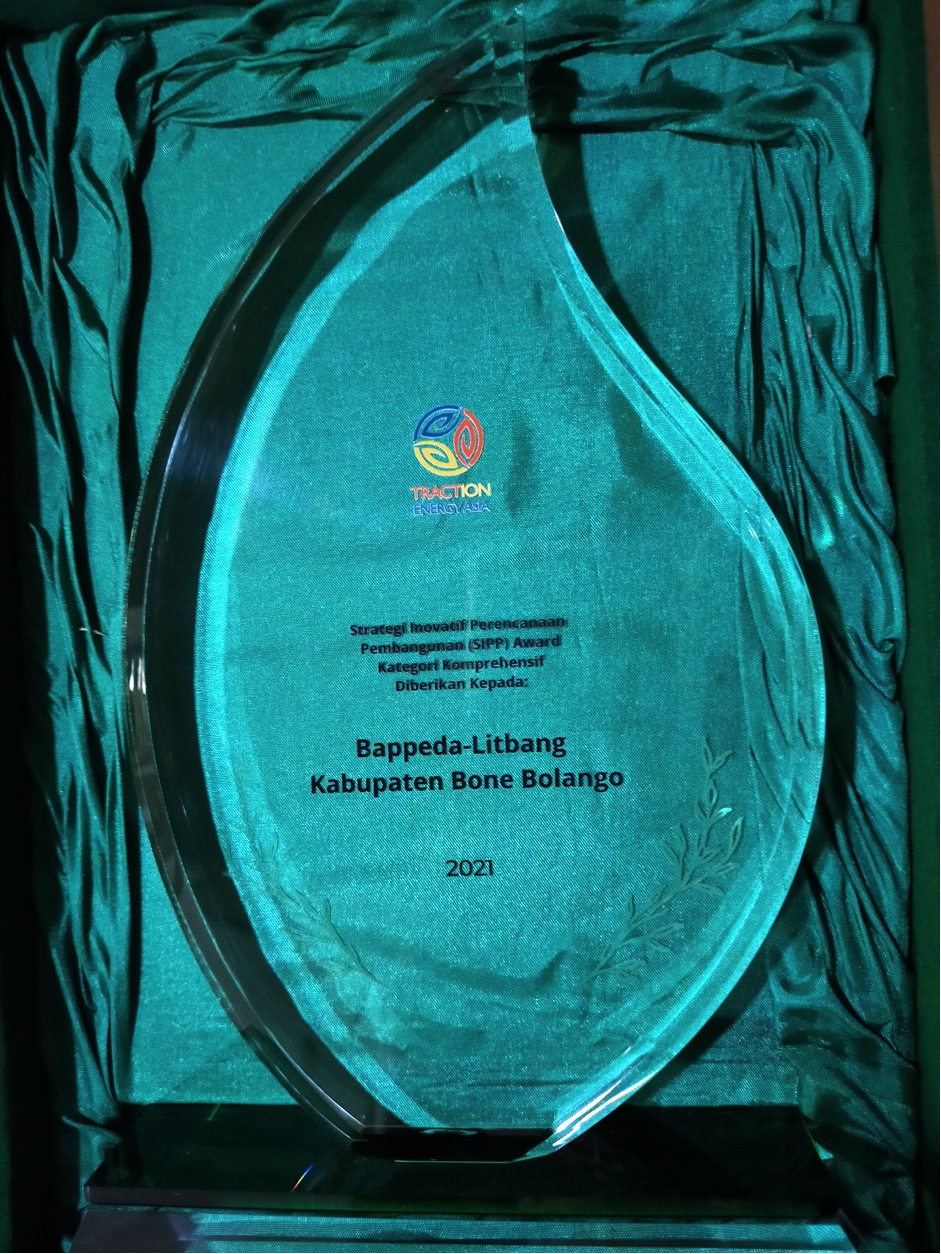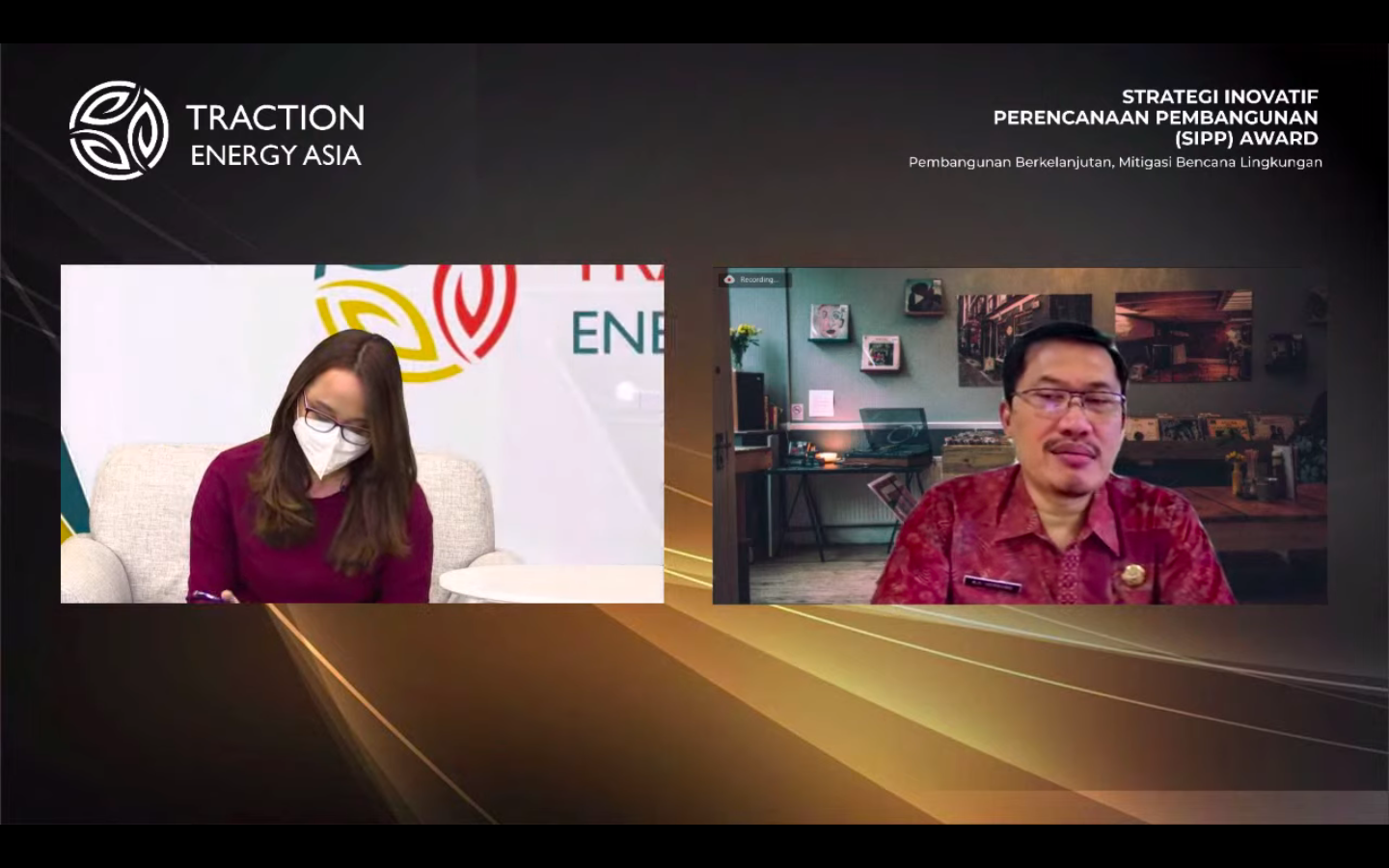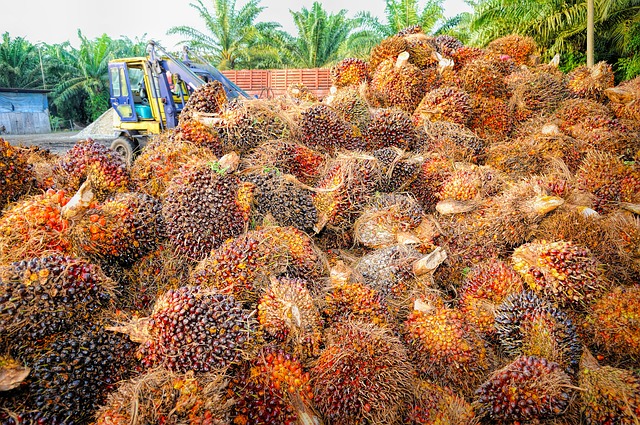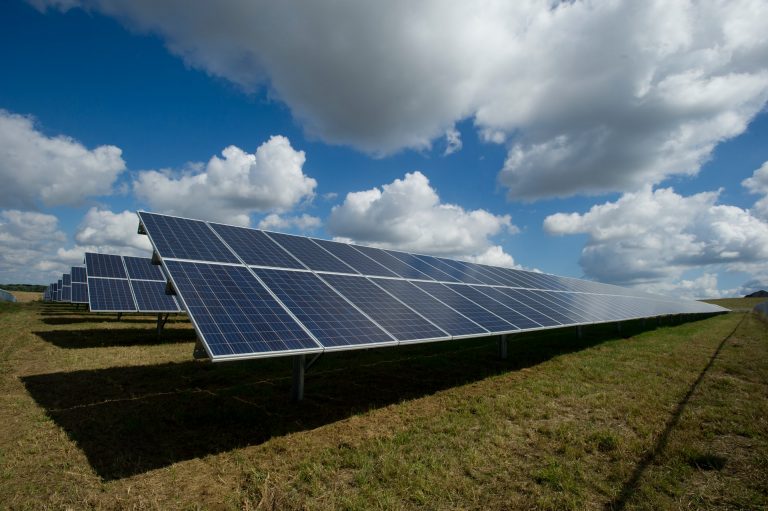
Bone Bolango, a regency in Gorontalo Province, is an organic district according to district head Hamim Pou, S.Kom, MH, as it prioritizes sustainability and environmental conservation in its regional development planning and policies. Hamim emphasized his point by saying that, “We want to continue to protect Bone Bolango Regency as the lungs of Gorontalo Province,” in his acceptance speech of Bone Bolango’s selection as the winner of the ‘Comprehensive’ category in the first Innovative Development Planning Strategy (SIPP) Awards, conceived and launched by Jakarta-based policy think tank, Traction Energy Asia.
The inaugural SIPP Awards ceremony was held online by Traction Energy Asia in collaboration with Tempo Impresario on July 28, 2021, and was the culmination of a series of mentoring sessions and coaching clinics for regional and local government officials to include sustainable development goals and mitigation for environmental and natural disasters in their regional development plans (RPJMD). Fourteen districts from five provinces participated in the program. The SIPP Awards are designed to appreciate the efforts of regional and local governments to incorporate the Low Carbon Development Indonesia program, initiated by the Ministry of National Development Planning (Bappenas), and the sustainable development goals (SDGs), in regional and local development planning.
The following are the five SIPP award categories and the winners in each category:
- ‘Comprehensive’ category: Bone Bolango Regency (Gorontalo).
- ‘Innovative’ category: Kapuas Hulu Regency (West Kalimantan).
- ‘Commitment’ category: Pelalawan Regency (Riau).
- ‘Initiative’ category: Manado City (North Sulawesi).
- ‘Persona’ category: Dr. Nanti Kasih, Musi Rawas Regency (South Sumatra).
Traction Energy Asia convened and facilitated a program of focus group discussions, national seminars, technical guidance workshops, and a coaching clinic focused on improving the quality of regional development plans (RPJMD) from November 2020 to June 2021.The coaching clinic was specifically designed to assist districts to integrate the low-carbon development agenda and mitigation of climate change and environmental disasters due to human activities into their regional development planning. The RPJMDs prepared by the districts were then assessed by a panel of experts for the SIPP Awards.
Tommy Ardian Pratama, Executive Director of Traction Energy Asia, opened the SIPP Awards by explaining how building the capacity of local governments, and recognizing their efforts also supports the central government’s commitment to the National Medium-Term Development Plan. Reading some of the participating districts’ commitments in their respective draft RPJMDs certainly makes protecting millions of hectares of forest and peatland believable.
“This technical training to incorporate sustainable, environmentally sound, and disaster-responsive development planning into the RPJMDs has the potential to help the participating districts protect nearly 7 million hectares of forest, and 2.5 million hectares of peatland. This is in line with Indonesia’s sustainable development and low carbon development targets.”
Winner of the SIPP Awards’ Comprehensive category, Bone Bolango Regency, prepared an environment-based RPJMD responsive to environmental disasters in accordance with Law no. 25/2004 concerning the National Development Planning System, and Regulation of the Minister of Home Affairs No. 86/2017 concerning Procedures for Planning, Controlling, and Evaluation of Regional Development. Bone Bolango also integrated the Regional Spatial Planning (RTRW) and Strategic Environmental Studies (KLHS) documents in their draft RPJMD to emphasize the protection and restoration of protected areas. The goal is that development does not cause flooding and landslides and does not reduce the quality of the environment.
This plan was translated into several environmental programs, namely increasing forest area through community-based reforestation, and increasing monitoring of activities that destroy forests. To ensure the quality of its development performance, the District Government of Bone Bolango is committed to establishing the Environmental Quality Index (IKLHK) and the Disaster Risk Index (IRB) as the main performance indicators with specific targets in the five-year period of the RPJMD.
Bagus Agung Herbowo, ST., MT. from the Directorate General of Regional Development (Ditjen Bina Bangda), Ministry of Home Affairs, and a member of the SIPP Awards panel of experts, spoke of the high level of commitment shown by the districts. “Local governments are committed to preparing the RPJMD by taking the sustainable development goals into account. This is in accordance with the principles of preparing planning documents, including making adjustments according to the conditions and potential of each region, in line with the dynamics of regional and national development, and taking into account environmental insights.”

A good example of this are the unique program ideas in the draft RPJMD of Kapuas Hulu Regency, winner of the ‘Innovative’ category, including the development of environmentally-based cultural and nature tourism, inclusive tourism village policies, and increasing the participation of indigenous peoples in preserving the environment.
The draft RPJMD of Pelalawan Regency, winner of the ‘Commitment’ category, focused on infrastructure development that is equitable, complete, and sustainable and prioritizes efforts to increase land cover areas and mitigate flood disasters. Pelalawan also demonstrated commitment to a sustainable infrastructure program through river normalization, reforestation of watersheds, tributaries, and coastal areas, as well as flood management in the city of Pangkalan Kerinci.
The city of Manado in North Sulawesi suffered floods and tidal waves in January 2021. In the draft RPJMD which was assessed for the SIPP Awards, Manado developed an initiative to overcome potential flood disasters. Manado also impressed the panel of experts with its natural resource management and spatial planning program, supervision of the implementation of environmental impact analysis (Amdal), as well as guidance and supervision of environmental permits and Environmental Protection and Management (PPLH) permits.
In addition to assessing the draft RPJMDs, the SIPP Awards also recognized the performance of participants in the series of mentoring events for the preparation of the RPJMD, with the ‘Persona’ category award. The winner of this category was Dr. Nanti Kasih from Musi Rawas for his active participation in coaching clinic activities and for leading the preparation of the Musi Rawas draft RPJMD. As a result, the Musi Rawas Regency draft RPJMD also integrates the KLHS document and is committed to implementing a pollution control program and controlling environmental damage.
In addition to the SIPP Awards, the ceremony also included a talk show “The Role and Support of the Central Government in Encouraging the Implementation of Sustainable Development in the Regions”. Three expert speakers shared their experiences and advice, Drs. Sumedi Andono Mulyo, M.A., Ph.D. Director of Spatial Planning and Disaster Management, Ministry of National Development Planning (Bappenas); Bagus Agung Herbowo, ST., MT., SIPP Awards panel of experts, Directorate General of Regional Development, Ministry of Home Affairs; and Dr. Joko Tri Haryanto, SE., ME., SIPP Awards panel of experts, Fiscal Policy Agency Ministry of Finance. On the sidelines of the discussion and award presentation, a band from Bandung, Kathampi, performed songs on the theme of nature conservation.
This regional capacity building program is set to continue. A number of participants asked Traction Energy Asia to provide similar sustainability trainings for other development plans, particularly the annual development plan, the Regional Government Work Plan (RKPD). The RKPD details implementation of the sustainable development programs and environmental disaster response in the regional development plans.




